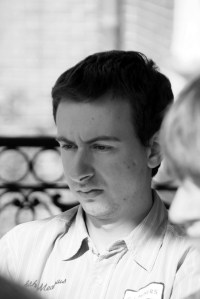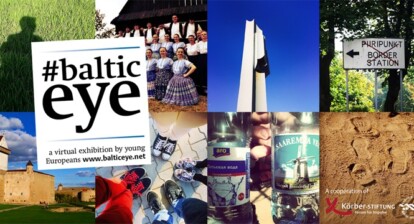Vlad, Romania
Vlad, who had finnished his BA in European Studies in Cluj-Napoca, Romania in 2011 found his exile story right in his family.
Vlad’s great-grandfather had to leave his family in 1952 when he was sent to a concentration camp for twelve months because of his opposition to the Comunist regime established in Rumania those years.
The story of Ioan Nicolau (1897-1975) is quite relevant to the topic of “Exile” since some moments of his life were marked by forced departures to hostile destinations. Although he was not obliged to leave the country, he was taken apart from his home, friends and relatives and sent to a far labour camp in Dobrogea where he was completely isolated from his family. Thus, keeping in mind the definition of the word “exile” extracted from the Romanian dictionary, we can say that he was indeed subjected to such a situation.
More significant to me is the personal connection that I have with Ioan – who was born more than a century ago – due to the family background that we share and, most important, due to our common way of thinking.
I never got the chance to meet my great-grandfather because he lived long before I was born. So the few things that I know of him are from my grandmother, his daughter, and from his 32-page file made in the 1950s by the Securitate, the Romanian secret police during the communist regime.
So who was Ioan? Ioan was a peasant who lived almost all of his life at the countryside, in the same village where my grandmother has been living for the past eight decades. At the time when communism was brutally installed in Romania, Ioan possessed 0.14 km2 of land, some buildings, a boiler for making plum brandy and a 12-horsepower mill. He had 5 years of primary education, he spoke only Romanian, he never assumed a public office but he “supported all former bourgeois political parties”. During the First World War he was a soldier in the Romanian Army. He had two children – a son and a daughter.
The communist officer who started to work on his file described him as “an arrogant element, a businessman, wicked beyond measure, very popular in his village and also in the neighbouring villages”. According to the file, after returnig from the war Ioan “occupied his time with harvesting and with the clandestine trade of plum brandy and he made quite a good fortune out of it, being able to also buy a mill”. When trying to shape the adequate portrait of a state criminal, the communist officer continued with his description of Ioan Nicolau as following: “an arrogant character who doesn’t obey the new laws, a vindictive element who steals cereal from the peasants so he can sell it later on at a speculative price”.
Apparently, my great-grandfather was sent to a labour camp because of his social status – the Securitate considered him a chiabur, a term which the communists used for labeling the landlords – and also because he had “good friends” in the village who, from time to time, informed the Securitate about his bad mouth. His file contains 10 reports given by 4 peasants during 14th August 1951 and 29th February 1952.
One of these reports submitted by a local peasant named Constantine on 17th November 1951 mentiones that Ioan reffered to the communists as “oxen” or “stupid, lazy people who steal cereal and wool from the working peasants to send it to Russia”. Another report dated 22nd January 1952 and signed by local peasant Matei informs that “one day when meeting some villagers Ioan said that the [communist] party is responsible for the starvation of the people and even though it claims to be the party of the labour the reality is completely different”. Another villager named Prunescu informed the Securitate that on the 8th February 1952 he was at Ioan’s mill and witnessed a skirmish between Ioan and about 7-8 peasants, whom Ioan strongly advised to stay united and not to deliver the individual share of meat to the party because in his opinion the party will face serious changes in the following spring. Again on 17th February 1952 Constantine informed the Securitate that Ioan had a discussion with some locals at his mill and told them that “the Americans will soon come and then Romania will be cleaned of these communists who make so much trouble to our people”.
The Americans never came. Instead, a black van of the Securitate came in March 1952 and took Ioan to a labour camp in Dobrogea. The file doesn’t mention anything about his 12-month detention. My grandmother said he didn’t talk about what happened during those months in Dobrogea, probably because of fear or simply because of bad memories. He came back with his health weakened. Due to the huge amount of dust which he inhaled when working at the Danube – Black Sea Channel, his lungs got severely affected. The only strong memory which my grandmother still has from back then is the powerful feeling of rejoice she felt when seeing her father returning alive from the place where many other political opponents perished.
In 2008 when I received Ioan’s file from the National Council for the Securitate’s Archives I immediately sent a copy to my grandmother. She was astonished to find names of people who were considered close to our family, friends, among the informers.
So who was Ioan? For the communits he was “an element who rebelled against the order of the new regime”. For me he remains a soldier, a true capitalist, an anti-communist, a hero.



Marta
great story, I really enjoyed reading it 😉